TUESDAY'S BIZ TIP:
TEAM PLAYER
Screenwriting is a "team sport" where you are usually working alone. This often leads to confusion - some new screenwriters don't understand when they need to be focused on individual accomplishment and when they need to be part of the team. Adding to the confusion is that there is a gray area where you need to fight for your individual accomplishments but still be loyal to the team, and times when you should consider the team even though you are at the individual accomplishment phase of the game. See, you're probably already confused! So let's take a look at how this works...
Basically, before you make the team you need to focus on individual accomplishment. Just like if you were trying out for a football team or basketball team, it's all about you doing *your* best and being the best of the group trying out. If this were a sports tryout (I think some pro football teams still have open tryouts), even though some of the people you are competing against may make it onto the team and you may be working *with* them, at this phase you are in competition against them - and if one of them stumbles and goes down, you don't help them up. You run past them and win.
But once you have made the team, the focus is on what is best for the team... and sometimes you have to sacrifice for the team. How many basketball and football players can we name who showboat? They bring the team down by not passing the ball and not being team players. It's all about *them* being the star - and the team suffers. Hey, that's true in screenwriting, too - and I'll explain how these analogies apply in just a minute. Once you have made the team - you need to be a team player.
Before you sell your script, it is all about individual accomplishment.
After the script is sold, it is all about being a team player.
Except for the gray areas.
PLAYING WITH YOURSELF

When you are writing a spec screenplay, it is all about writing the absolute best screenplay possible. Whatever makes your screenplay better - you do that. I have a Script Tip in rotation that was adapted to be part of the Action Book revision called "You Can't Do That In A Movie!" about those scenes and moments that sell the script... but are usually the first to be cut once the script is sold.
In "Night Hunter" the scene that sold the script was one where the protagonist (who is the last of the vampire hunters) talks about the horrors of his job - which include killing children who are vampires. They may be hundreds of years old and may have fed off thousands of humans... but they still look like kids. Killing them is not easy. Everyone loved that scene and talked about that scene... but after that script sold and we had our first rewrite meeting it was the first scene they wanted cut. Can't have the hero killing children!
Similar thing with "Hard Evidence", where the scene was not about how difficult it was to kill... but how easy it was. The protagonist in that story was a nice guy businessman who was forced to kill a criminal who was making his life hell... and admitted to his best friend that instead of feeling guilt and remorse, he felt elation. He had solved a problem. You are supposed to feel bad after you kill someone, but he felt *great*! Again, this was the scene that sold the screenplay - the scene they talked to me about in the first couple of meetings as their favorite scene... and the first scene that got cut in rewrites. Though, actually, I convinced them not to cut the scene but to give the dangerous dialogue to the best friend.
And just about every screenplay I have sold has had some scene in it that made such a powerful impact on the reader that they recommended the script to the producers... who were also impacted by that scene (or scenes) and bought the script... and later wanted that scene cut because it was too dangerous. That scene was all about individual accomplishment, but the producers feared it may not be a team player.
*Without* those scenes those screenplays would never have sold.
Before the script sells - it is all about individual accomplishment.
Though we are still writing *movies*, at this phase our job is to amaze them with *our* amazing skills, and not be a team player. We don't want to pull our punches or soften our story or do anything that will make the script tame or bland or unusual. Or job here is to make it the *unusual* script - the amazing script - the one in a million script. And those are probably pretty close to the odds of selling a screenplay - one in a million. So you need to push the envelope to stand out...
FREE THROW PIROUETTES

The "gray area" here is that we are still writing movies. Those scenes that stand out also have to belong in the story - you can't just paste something outrageous onto the story to make it sell... that will probably make it *not* sell. My two examples above are scenes that belong in those stories and completely fit the tone and story and expectations of those stories. I fought against having them cut... but had to take one for the team. Just adding some over-the-top violence or weird-ass stuff that isn't necessary to the story is not going to get your script sold. You *always* want to be true to the script. If you are trying out for the team and you do some ballet when you are shooting free throws, you aren't going to impress anyone. You're just going to look weird.
If you mix oil-and-water tones or write some story that is so unusual no one can figure out what the hell it is, your script may stand out in the wrong way. I read a script that was a fun buddy comedy... until the extremely violent and graphic torture scene that was so detailed I thought I might barf halfway through the scene. That scene didn't fit the rest of the script at all. That *scene* was not a team player in the script! You always want your scenes to make the script *better*, not sabotage it. I've also read scripts that were like no movie ever made and had me wondering if the writer had ever actually *seen* a movie. The goal of the individual achievement phase is to show that you can write the most amazing *movie screenplay* ever written. The basketball team isn't going to hire you because you do amazing pirouettes - they care about your basketball skills.
TAKING ONE FOR THE TEAM

Once you have sold the screenplay, you are on the team - and now when that runner stumbles your job may be to stop and help them up. You are not fighting for your script anymore, you are fighting for *the movie*... and the movie may end up completely different than the screenplay you sold them.
I have been interviewed by Variety and was featured in the Hollywood Reporter's Writers Special Issue once... but the only "news link" that has ever been submitted to my IMDB page is a blog where the blogger was deeply offended by a script tip where I talk about the reality of rewrites. In their little blogger bubble they thought that once a screenplay sold it would never be changed at all - and make it to the screen exactly as the writer envisioned it. That is not a team player...
And here is where some of the confusion sets in.
Before you sell the screenplay *you* are the boss and you should make that screenplay the absolute greatest screenplay ever written and not pull any punches or water it down or anything else that makes it less than the greatest.
After you sell the screenplay? You are not the boss. You no longer own the screenplay. You are an employee of the producer... and now your job may seem like the *opposite* of what it was only a couple of days ago. Now your job is to conform the screenplay to what the producer needs it to be.
I think I have a tip that talks a bit about my TREACHEROUS script that I rewrote for every star that was attached (or that the producer was going after to try to attach). The original version of that script was about a retired athlete - the inspiration for the story was a newspaper article I read about a pro football player who had spent all of his money and now owned and operated a diner in Oakland, CA. Sometimes he worked as the fry cook. He had bought the place as an investment when he was rich... and now it was all that he had left. Burned out used-to-be character. That was my lead. By the time they made the film I had done dozens of rewrites for each attached star and now the lead was played by C. Thomas Howell - who was in his 30s. So my job was to be a team player and make the *movie* the best it could be - and that meant rewriting that lead role for a youthful guy in his early 30s. Keeping the original version of the protagonist would hurt the film - who would believe that C. Thomas Howell was and old retired guy?
And the same thing happens in just about every production - once the screenplay has sold it becomes part of the movie, and you need to make it work as part of that movie. HARD EVIDENCE was a spec script that sold to a producer who made USA Network Movies Of The Week. That meant that part of my rewrite was putting in the commercial breaks. Here's the thing - if I had written that screenplay with the commercial breaks already there, I'm not sure they would have bought it. That's kind of a cart-before-the-horse thing. I know for sure that if I had removed that dangerous scene they would *not* have bought it, because they told me that's the reason why they bought it... and then a couple of meetings later told me to get rid of that scene, Gregory Harrison isn't going to play some guy who is *happy* about killing people... and USA Network isn't going to let that scene air. As a team player, I had to "fix that" so that the *movie* would be the greatest it could be.
By the way, on HARD EVIDENCE that wasn't the only scene that was changed. Though that film is the closest to any of my screenplays, all kinds of things changed for the good of the movie. The original script took place in Los Angeles and Ensenada, Mexico... but the producers were going to shoot in Canada, so all of the locations had to change. Plus, because a Movie Of The Week doesn't just play on TV, the PG-13 sex scenes in my script were pushed up to what seemed like a pretty hard R for the video and international release. I didn't know about that until *after* I'd sent my parents a copy of the video. But one of the elements of *any* film is that it will play in a variety of different markets and there will probably be additional footage shot to comply with that. One of my films had that typical cops-in-a-strip-club scene and they shot the R rated version with strippers taking it off in the background... and the PG version with them dancing in bikinis. That way the film could play on TV and airplanes and sell to any country where they had strict censorship.
You don't *write* the scene with the strippers wearing bikinis or burquas, but they might film it that way. Because the video aftermarket is big business on an MOW, you probably will write the R rated scenes so that they can shoot them. If they don't shoot those scenes when they shoot the rest of the movie they'll be in a heap-o-trouble when they do foreign sales or domestic video deals. I know on some of my projects there has been a TV cut and a video cut - with the video cut being 10-12 minutes longer. People would rather see the R rated or unrated version of the film than the tame version that played on TV. If those scenes are not already in the screenplay, you'll probably end up writing them in order to be a team player.
HACK!

And here's where that blogger comes in and calls you a hack because they don't realize that once you sell the script you go from individual accomplishment to team player - from owner of the screenplay to employee - from doing what is best for the screenplay to doing what will be best for the film. The gray area here is that you are not some mindless do-as-you-are-told-and-don't-ask-questions team player, you are the expert at the writing part of the movie and part of your job is to fight for *what is best for the film*. If your script was about a gritty burned out male homicide detective and they cast Anna Faris in that role, your job is to make it the very best script with that casting... and that may mean you fight for some gritty scenes they want to get rid of. But if those scenes will make the *Anna Faris version* better, you want them in the film. Just because you are now a team player doesn't mean that you don't use your individual skills - you just use them in service of the team... and to make the *movie* great. Your script may have been "A", the movie may end up "Z", so now your job is to make it the best "Z" ever! That's not hacking, that's being a team player - and many writers are great at individual accomplishment and awful at being a team player. They can't get over that the role they wrote for Clint Eastwood is now going to be played by Anna Faris. They just can't switch gears like that, so they fight to keep it a Clint Eastwood movie even though it now stars Anna Faris... and that means that instead of making it a great movie, the result of their fight ends up making it a *bad* movie. Instead of seeing the big picture, they only see *their* part of the movie. They are showboating... and they will bring down the team.
Once you have made the team, your job is to make the film the best film ever - even if it is a different film that your screenplay. If there are changes that will damage the film, your job is to fight those changes. But if there is something in your original screenplay that works against the film version - your job is to let go of that scene or element and do what is best for the film version. That isn't hacking at all - it's just making sure the *film version* is the greatest it can be, and that means you are playing for the team and not against it.
But to make that team in the first place, you need to be great at individual accomplishment and *not* write what you think they may want (you don't really know exactly what they want) and *not* pull your punches, and *not* water down the story or make it safe and bland - you want to make it the very best screenplay it can ever be. Selling that script is a one in a million deal, and you need to make sure that your screenplay isn't just good (many screenplays are good), but absolutely the greatest screenplay there is. No one buys a good screenplay because it fits their needs - there are *thousands* of good screenplays that fit their needs (unless it's one of those InkTip adverts looking for a western with dance numbers that can be shot in Iceland and stars little people and was written by a Canadian) - so your script has to be the GREATEST SCRIPT OUT THERE and after they buy it (and you are a team player) they will have you make the changes so that it conforms to their needs.
Or, they will hire you to write that western with dance numbers...
Or a horror musical.
BRAND NEW!
How Do I do That?

101 SCREENWRITING ANSWERS Blue Book!
New to screenwriting? You probably have questions! How do I get an Agent? How do I write a phone conversation? Do I need a Mentor? What’s does VO and OC and OS mean? What is proper screenplay format? Should I use a pen name? Do I need to movie to Hollywood? What’s the difference between a Producer and a Production Manager, and which should I sell my script to? How do I write a Text Message? Should I Copyright or WGA register my script? Can I Direct or Star? How do I write an Improvised scene? Overcoming Writer’s Block? How do I write a Sex Scene? And many many more! This book has the answers to the 101 Most Asked Questions from new screenwriters! Plus a Glossary of terms so that you can sound like a pro! Everything you need to know to begin writing your screenplay!
All of the answers you need to know, from a working professional screenwriter with 20 produced films and a new movie made for a major streaming service in 2023!
Only $4.99
NEWEST AND BLUEST!
Want To Look Like An Expert?

RESEARCH & WORLD BUILDING Blue Book!
Does this gun fire 6 shots or only 5? In all of the excitement of writing your action scene, you might not have done the research... and your hero could be out of ammo! Whether you are writing a novel or screenplay, you can save your hero, and your story, by doing a little research first! This book looks at Why you should research, Whether you should research First or Later, PLUS the importance of World Building in Science Fiction, Fantasy... and the worlds you explore in every other genre. Movies like JOHN WICK and THE GODFATHER take place in their own unique worlds... and writers must create them! YOU are the technical advisor on your Screenplay or Novel.
Using movie examples like TOP GUN, HUNT FOR RED OCTOBER, BLUE CRUSH, ADVENTURE LAND, several of my produced films, JOHN WICK, the novels of Donald E. Westlake and Thomas B. Dewey, SPY KIDS, the LORD OF THE RINGS movies, SOYLENT GREEN (which takes place in the far off future of 2022), and many others we will look at researching stories and creating worlds. The 8 Types Of Research, the 10 Types Of Information To Look For, 12 Important Elements Of World Building. Plus chapters on How To Rob A Bank and Commit Murder And Get Away With It for those of you interested in crime fiction, and Researching The Future for those writing science fiction, and Levels Of Reality if you are writing about a version of the real world.
No matter what you are writing, this book will help you find the facts... or make them up in a convincing way!
Only $4.99
NO KINDLE REQUIRED! Get the *free* app (any device, except your Mr. Coffee) on the order page on Amazon!
NEWISH!
Can You Make It bigger?

BLOCKBUSTERS (and BEACH READS) Blue Book!
Writing something EPIC?
ONLY: $4.99!
Thinking about writing a big Disaster Movie? An Historical Epic? An Epic Adventure Film? Or maybe you like Gladiator Movies? This book looks at writing Blockbusters and those Big Fat Beach Read novels - anything epic! Usng movies like JAWS, POSEIDON ADVENTURE, LAWRENCE OF ARABIA, THE GUNS OF NAVARONE, and those MARVEL and FAST & FURIOUS flicks as examples. What *is* a Blockbuster? 107 years of Blockbuster history! Blockbuster Characters. Blockbuster Story Types! Why modern Blockbusters are soap operas! Social Issues in Blcokbusters? Big Emotions! Keeping All Of Those Characters Distinctive! How to avoid the Big problems found in Big Movies and books! More! If you are writing a Big Event Movie or a Big Fat Novel, there are tips and techniques to help you!
Only $4.99
NEW in 2020!
Making Your Own Movie?
WRITE IT: FILM IT BOOK!

Making Your Own Movie?
Writing An Indie Film?
Writing A Low Budget Genre Script To Sell?
Writing A Made For TV Holiday Movie?
You will be writing for BUDGET. On a standard spec screenplay, you don’t have to think about budget, but these types of screenplays writing with budget in mind is critical!
If you are making your own movie, budget, is even more important - and you need to think about budget *before* you write your screenplay... or you will end up with a script that you can’t afford to make (or is a struggle to make). Everyone is making their own films these days, and even if you have done it before there are lots of great techniques in this book to get more money on screen - for less money! You can make a film that looks like it cost millions for pocket change.
344 Pages - ONLY: $7.99!
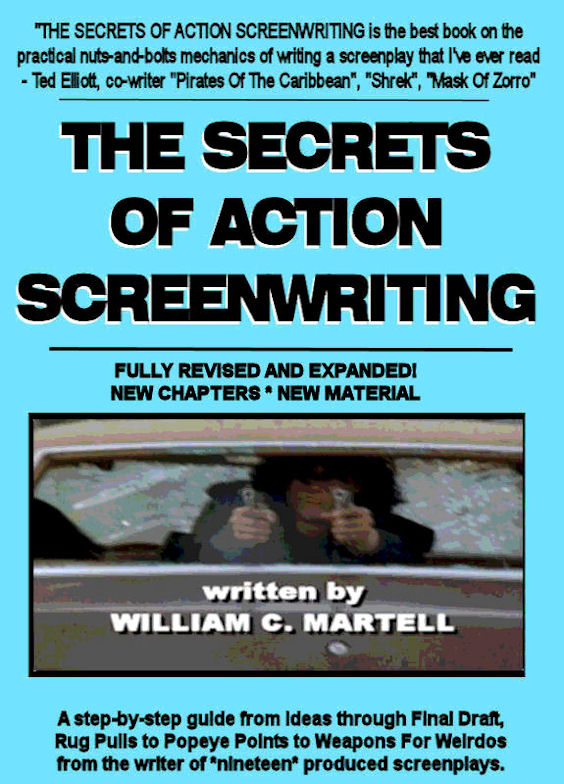
THE BOOK THAT STARTED IT ALL!
*** THE SECRETS OF ACTION SCREENWRITING *** - For Kindle!
*** THE SECRETS OF ACTION SCREENWRITING *** - For Nook!
Why pay $510 for a used version of the 240 page 2000 version that used to retail for $21.95? (check it out!) when
you can get the NEW EXPANDED VERSION - over 500 pages - for just $9.99? New chapters, New examples, New techniques!
"SECRETS OF ACTION SCREENWRITING is the
best book on the practical nuts-and-bolts mechanics of writing a screenplay I've ever read."
- Ted Elliott, co-writer of MASK OF ZORRO, SHREK, PIRATES OF THE CARIBBEAN and the sequels (with Terry Rossio). (ie; 4 of the top 20 Box Office Hits Of ALL TIME.)
Only $9.99 - and no postage!
NO KINDLE REQUIRED! Get the *free* app (any device, except your Mr. Coffee) on the order page on Amazon!
BRAND NEW!
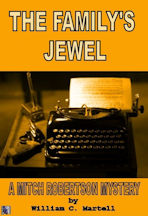
***
MITCH ROBERTSON #2: THE FAMILY'S JEWEL *** - For Kindle!
"The Presidential Suite of the Hollywood Hoover Hotel looked like a bloody battlefield: bodies everywhere, furniture broken, red liquid dripping from the walls, dead soldiers littering the elegant Berber rug as clouds of smoke overhead bounced between two air conditioning vents.
Mitch Robertson stepped over the body of an ex-child star turned sex tape star turned pop star and entered the room, spotted a gun on the floor and picked it up... careful not to spill his coffee with three pumps of mocha syrup from Penny’s Coffee Shop. That coffee was gold, the only thing keeping him going in this dazed state of wakefulness. The gun felt light. Holding it, he saw the silhouette of an 80s action star sitting sideways on a tipped over chair. Motionless. Was he dead? Mitch was still hung over from the Awards Party the night before, and wondered whether this was all some sort of crazy nightmare that he would wake up from... but when he tripped over the brown legs of a bottomless Superhero, flaccid junk encased in a condom but still wearing his mask, and hit the edge of the sofa, gun skittering and coffee spilling, he realized that it was all very real. What the hell had happened here?"
Short Novel. Only 99 cents! - and no postage!
ADVICE FROM 1920!
*** VINTAGE #1: HOW TO WRITE PHOTOPLAYS *** - For Kindle!
***
Screenwriting books have been around as long as films have. This series reprints vintage screenwriting books with a new introduction and history, plus new articles which look at how these lessons from almost 100 years ago apply to today’s screenplays. Anita Loos book is filled with information which still applies.
In addition to the full text of the original book, you get the full screenplay to Miss Loos' hit THE LOVE EXPERT, plus several new articles on the time period and women in Hollywood.
ONLY $2.99 - and no postage!
Tips FAQ

My New Script Secrets Newsletter!


STORY IN ACTION SERIES!

THE MISSION IMPOSSIBLE MOVIES
NEW: Updates On Films 7 & 8 Casting!
All Six Movies analyzed! All of the mission tapes, all of the “that’s impossible!” set pieces and stunts, the cons and capers - and how these scenes work, the twists and double crosses, the tension and suspense (and how to generate it), the concept of each film as a stand alone with a different director calling the shots (broken in the sixth film), the gadgets, the masks, the stories, the co-stars and team members (one team member has been in every film), the stunts Tom Cruise actually did (and the ones he didn’t), and so much more! Over 120,000 words of fun info!
THE MISSION IMPOSSIBLE MOVIES - 347 Pages - Only $3.99 !

BRAND NEW!
*** THE BOURNE MOVIES
NEW: Updates on TREADSTONE TV show!
All five "Bourne" movies (including "Legacy" and it's potential sequels) - what are the techniques used to keep the characters and scenes exciting and involving? Reinventing the thriller genre...
or following the "formula"? Five films - each with an interesting experiment! A detailed analysis of each
of the films, the way these thrillers work... as well as a complete list of box office and critical
statistics for each film. This book is great for writers, directors, and just fans of the series.
Only $3.99 - and no postage!
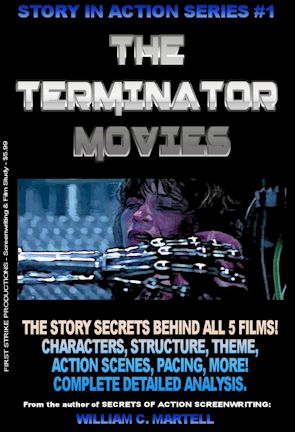
Over 240 pages!
*** THE TERMINATOR MOVIES *** - For Kindle!
He's back! The release of "Terminator: Dark Fate" is set to begin a new trilogy in
the Terminator story... 35 years after the first film was released. What draws us to these films about
a cybernetic organism from the future sent back in time? Why is there a new proposed trilogy every few
years? This book looks at all five Terminator movies from a story standpoint - what makes them work
(or not)? What are the techniques used to keep the characters and scenes exciting and involving? How
about those secret story details you may not have noticed? Containing a detailed analysis of each of
the five films so far, this book delves into the way these stories work... as well as a complete list of
box office and critical statistics for each film. This book is great for writers, directors, and just
fans of the series.
ONLY $3.99 - and no postage!
NO KINDLE REQUIRED! Get the *free* app (any device, except your Mr. Coffee) on the order page on Amazon!
HITCHCOCK FOR WRITERS!
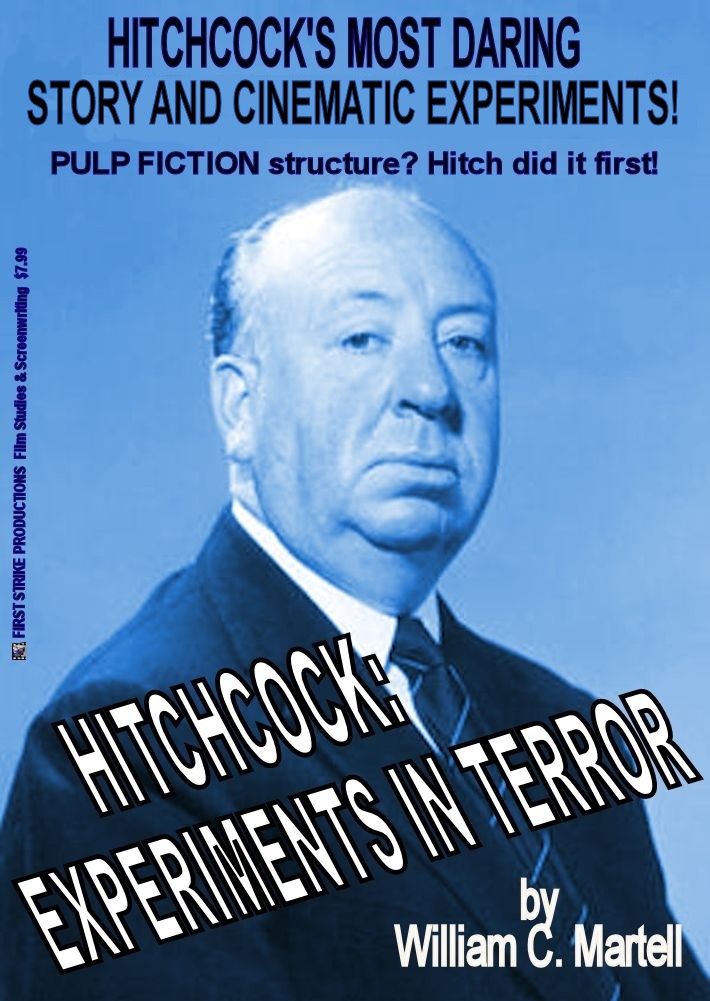
Strange Structures!
*** HITCHCOCK: EXPERIMENTS IN TERROR! *** - For Kindle!
***
Contained Thrillers like "Buried"? Serial Protagonists like "Place Beyond The Pines"? Multiple Connecting Stories like "Pulp Fiction"? Same Story Multiple Times like "Run, Lola, Run"?
HITCHCOCK DID IT FIRST!
This book focuses on 18 of Hitchcock's 52 films with wild cinema and story experiments which paved the way for modern films. Almost one hundred different experiments that you may think are recent cinema or story inventions... but some date back to Hitchcock's *silent* films! We'll examine these experiments and how they work. Great for film makers, screenwriters, film fans, producers and directors.
Only $5.99 - and no postage!
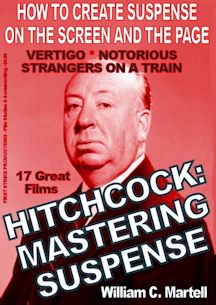
LEARN SUSPENSE FROM THE MASTER!
*** HITCHCOCK: MASTERING SUSPENSE *** - For Kindle!
Alfred Hitchcock, who directed 52 movies, was known as the *Master Of Suspense*; but what exactly is suspense and how can *we* master it? How does suspense work? How can *we* create “Hitchcockian” suspense scenes in our screenplays, novels, stories and films?
This book uses seventeen of Hitchcock’s films to show the difference between suspense and surprise, how to use “focus objects” to create suspense, the 20 iconic suspense scenes and situations, how plot twists work, using secrets for suspense, how to use Dread (the cousin of suspense) in horror stories, and dozens of other amazing storytelling lessons. From classics like “Strangers On A Train” and “The Birds” and “Vertigo” and “To Catch A Thief” to older films from the British period like “The 39 Steps” and “The Man Who Knew Too Much” to his hits from the silent era like “The Lodger” (about Jack The Ripper), we’ll look at all of the techniques to create suspense!
Only $5.99
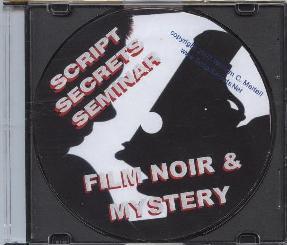
AUDIO CLASS!
NOIR & MYSTERY80 minute CD packed with information on writing Film Noir and Mystery scripts. Using examples from CHINATOWN to OUT OF THE PAST to DOUBLE INDEMNITY you'll learn how to create stories in this dark, twisted genre. How to plant clues, red herrings, suspects, victims, spider women, fallen heroes, the funhouse mirror world of noir supporting characters... and the origins of Film Noir in literature Noir dialogue and how noir endings are different than any other genre. All of the critical elements necessary to write in this critically popular genre.
The Noir & Mystery Class is only $15 (plus $5 S&H). First 20 on Limited Black Disk!
RECESSION SALE! $5 OFF!
IDEAS AND CREATIVITY - 80 minute CD packed with information. Tools to find ideas that are both personal *and* commercial. Hollywood wants scripts with High Concept stories... but not stupid scripts. Developing *intelligent* high concept ideas. How to turn your personal story into a blockbuster - or find your personal story in a high concept idea. Brainstorming and being creative. Ideas and Creativity is $10.00 (plus $5 S&H)
WRITING INDIES - Writing an Indie film? This class covers everything you need to know - from Central Locations to Confined Cameos. Using examples from SWINGERS, THE COOLER, STATION AGENT and others, this 80 minute CD is packed with information. How Indoe films challenge the audience (while mainstream films reassure the audience). Structures, using BOYS DON'T CRY, RUN LOLA RUN, HILARY & JACKIE, and others as example. Writing for a budget, writing for non-actors, getting the most production value out of your budget. Writing Indies is $10.00 (plus $5 S&H)
WRITING HORROR - The essentials of a horror screenplay - what do ROSEMARY'S BABY, NIGHT OF THE LIVING DEAD, THE EXORCIST, BRIDE OF FRANKENSTEIN, THE OTHERS and OPEN WATER have in common? This class will tell you! All of the critical elements necessary to write a script that scares the pants off the audience. Writing Horror is $10.00 (plus $5 S&H).
Click here for more information on CLASS CDs!
THE BLUE BOOKS!
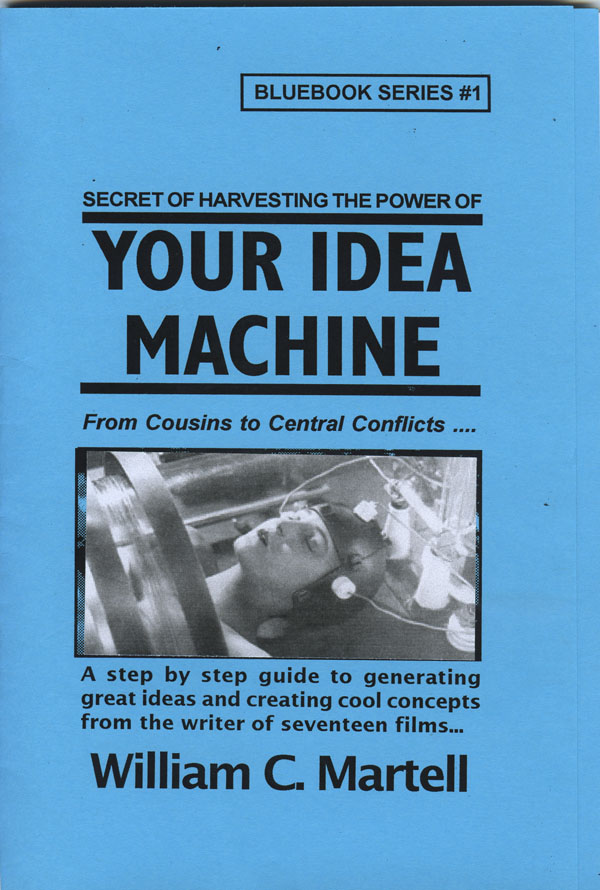
FIND A GREAT IDEA!
*** YOUR IDEA MACHINE *** - For Kindle!
****
Expanded version with more ways to find great ideas! Your screenplay is going to begin with an idea. There are good ideas and bad ideas and commercial ideas and personal ideas. But where do you find ideas in the first place? This handbook explores different methods for finding or generating ideas, and combining those ideas into concepts that sell. The Idea Bank, Fifteen Places To Find Ideas, Good Ideas And Bad Ideas, Ideas From Locations And Elements, Keeping Track Of Your Ideas, Idea Theft - What Can You Do? Weird Ways To Connect Ideas, Combing Ideas To Create Concepts, High Concepts - What Are They? Creating The Killer Concept, Substitution - Lion Tamers & Hitmen, Creating Blockbuster Concepts, Magnification And The Matrix, Conflict Within Concept, Concepts With Visual Conflict, Avoiding Episodic Concepts, much more! Print version is 48 pages, Kindle version is over 175 pages!
Only $4.99 - and no postage!
FIGURE OUT YOUR STORY!
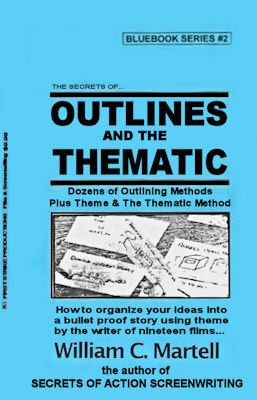
OUTLINES & THE THEMATIC Blue Book.
ARE YOUR SCENES IN THE RIGHT ORDER?
AND ARE THEY THE RIGHT SCENES?
Your story is like a road trip... but where are you going? What's the best route to get there? What are the best sights to see along the way? Just as you plan a vacation instead of just jump in the car and start driving, it's a good idea to plan your story. An artist does sketches before breaking out the oils, so why shouldn't a writer do the same? This Blue Book looks at various outlining methods used by professional screenwriters like Wesley Strick, Paul Schrader, John August, and others... as well as a guest chapter on novel outlines. Plus a whole section on the Thematic Method of generating scenes and characters and other elements that will be part of your outline. The three stages of writing are: Pre-writing, Writing, and Rewriting... this book looks at that first stage and how to use it to improve your screenplays and novels.
Only $4.99 - and no postage!
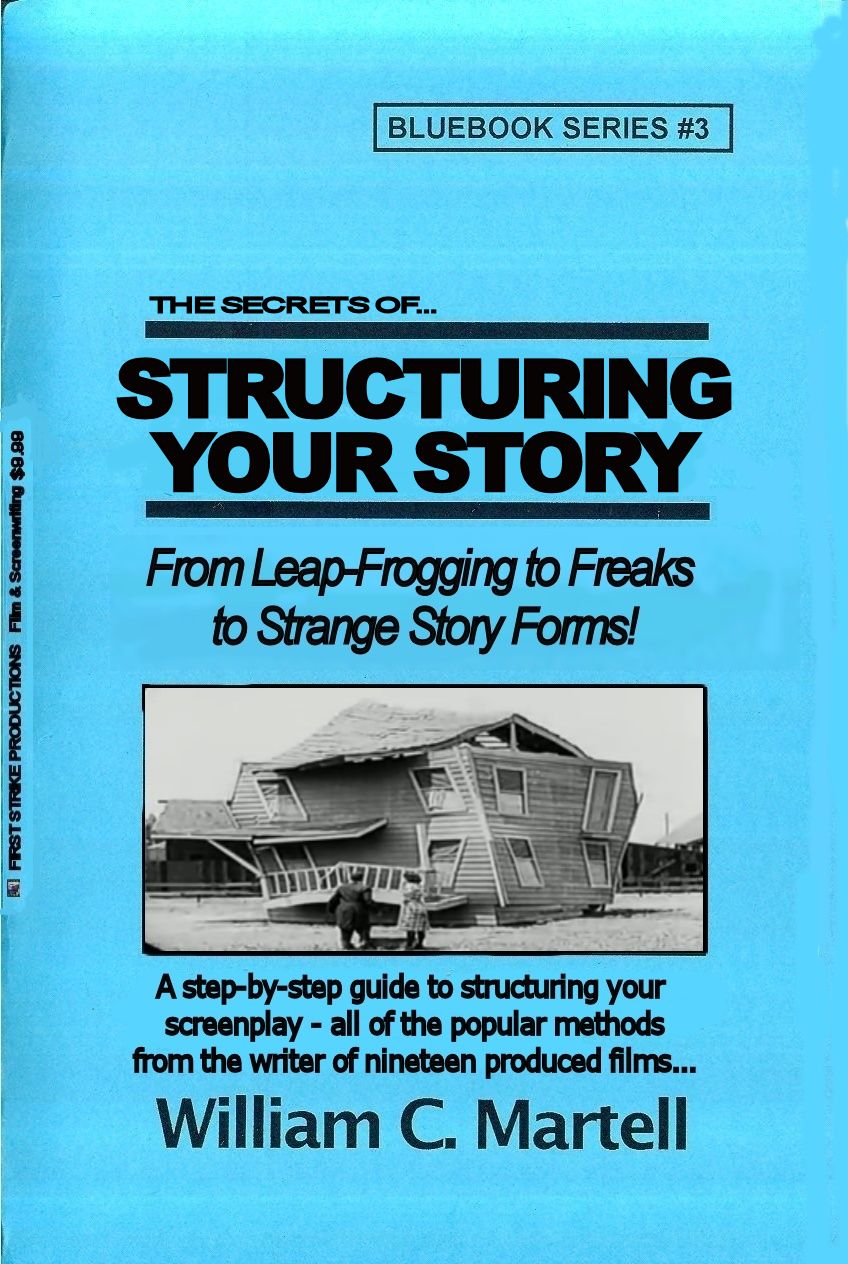
GOT STRUCTURE?!
*** STRUCTURING YOUR STORY *** - For Kindle!
William Goldman says the most important single element of any screenplay is structure. It’s the skeleton under the flesh and blood of your story. Without it, you have a spineless, formless, mess... a slug! How do you make sure your structure is strong enough to support your story? How do you prevent your story from becoming a slug? This Blue Book explores different types of popular structures from the basic three act structure to more obscure methods like leap-frogging. We also look at structure as a verb as well as a noun, and techniques for structuring your story for maximum emotional impact. Most of the other books just look at *structure* and ignore the art of *structuring* your story. Techniques to make your story a page turner... instead of a slug!
Only $4.99 - and no postage!

STORY: WELL TOLD!
*** STORY: WELL TOLD *** - For Kindle!
This book takes you step-by-step through the construction of a story... and how to tell a story well, why Story always starts with character... but ISN'T character, Breaking Your Story, Irony, Planting Information, Evolving Story, Leaving No Dramatic Stone Unturned, The Three Greek Unities, The Importance Of Stakes, The Thematic Method, and how to create personal stories with blockbuster potential. Ready to tell a story?
Print version was 48 pages, Kindle version is over 85,000 words - 251 pages!
Only $4.99 - and no postage!

START STRONG!
*** HOOK 'EM IN TEN *** - For Kindle!
Your story doesn't get a second chance to make a great first impression, and this book shows you a
bunch of techniques on how to do that. From the 12 Basic Ways To Begin Your Story, to the 3 Stars Of
Your First Scene (at least one must be present) to World Building, Title Crawls, Backstory, Starting
Late, Teasers and Pre Title Sequences, Establishing Theme & Motifs (using GODFATHER PART 2), Five Critical
Elements, Setting Up The Rest Of The Story (with GODFATHER), and much more! With hundreds of examples
ranging from Oscar winners to classic films like CASABLANCA to some of my produced films (because
I know exactly why I wrote the scripts that way). Biggest Blue Book yet!
Print version was 48 pages, Kindle version is over 100,000 words - 312 pages!
Only $4.99 - and no postage!
NO KINDLE REQUIRED! Get the *free* app (any device, except your Mr. Coffee) on the order page on Amazon!
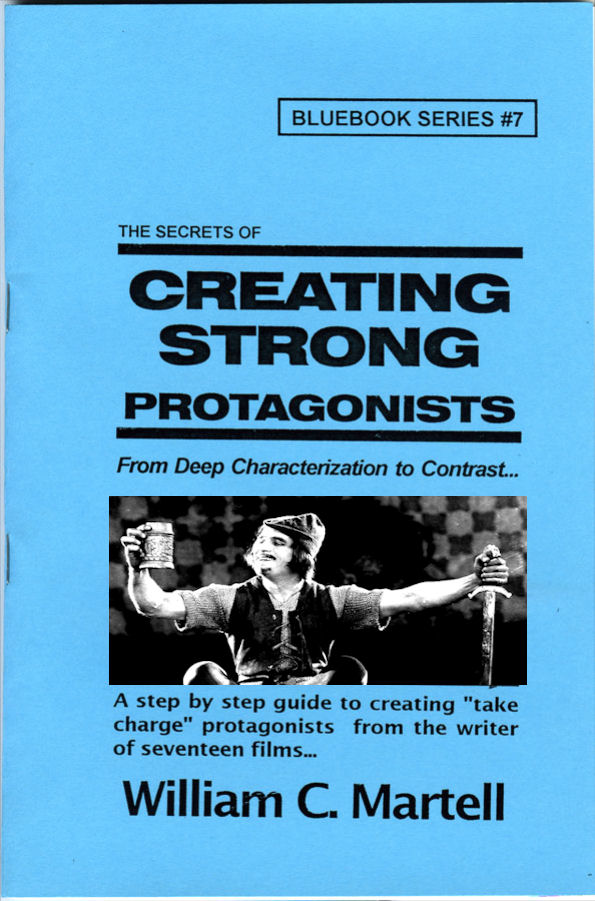
MOVIES ARE CHARACTERS!
*** CREATING STRONG PROTAGONISTS *** - For Kindle!
*** CREATING STRONG PROTAGONISTS *** - For Nook!
Expanded version with more ways to create interesting protagonists! A step-by-step guide to creating "take charge" protagonists. Screenplays are about characters in conflict... characters in emotional turmoil... Strong three dimensional protagonists who can find solutions to their problems in 110 pages. But how do you create characters like this? How do you turn words into flesh and blood? Character issues, Knowing Who Is The Boss, Tapping into YOUR fears, The Naked Character, Pulp Friction, Man With A Plan, Character Arcs, Avoiding Cliche People, Deep Characterization, Problem Protagonists, 12 Ways To Create Likable Protagonists (even if they are criminals), Active vs. Reactive, The Third Dimension In Character, Relationships, Ensemble Scripts, and much, much more. Print version is 48 pages, Kindle version is once again around 205 pages!
ONLY $4.99 - and no postage!
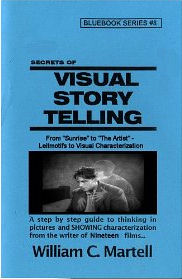
I WRITE PICTURES!
*** VISUAL STORYTELLING *** - For Kindle! (exclusive)
Show Don't Tell - but *how* do you do that? Here are techniques to tell stories visually! Using Oscar Winning Films and Oscar Nominated Films as our primary examples: from the first Best Picture Winner "Sunrise" (1927) to the Oscar Nominated "The Artist" (which takes place in 1927) with stops along the way Pixar's "Up" and Best Original Screenplay Winner "Breaking Away" (a small indie style drama - told visually) as well as "Witness" and other Oscar Winners as examples... plus RISE OF THE PLANET OF THE APES. Print version is 48 pages, Kindle version is over 200 pages!
ONLY $4.99 - and no postage!
DESCRIPTION & VOICE Blue Book!
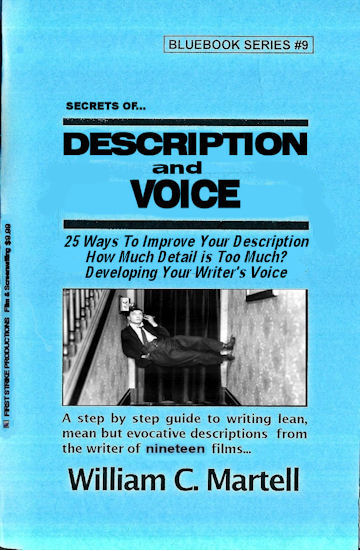
DESCRIPTION & VOICE Blue Book.
IS HALF OF YOUR STORY IN TROUBLE?
Most screenplays are about a 50/50 split between dialogue and description - which means your description is just as important as your dialogue. It just gets less press because the audience never sees it, the same reason why screenwriters get less press than movie stars. But your story will never get to the audience until readers and development executives read your script... so it is a very important factor. Until the movie is made the screenplay is the movie and must be just as exciting as the movie. So how do you make your screenplay exciting to read? Description is important in a novel as well, and the “audience” does read it... how do we write riveting description?
Only $4.99 and no postage!

PRO DIALOGUE TECHNIQUES!
*** DIALOGUE SECRETS *** - For Kindle!
***
Expanded version with more ways to create interesting dialogue! How to remove bad dialogue (and what *is* bad dialogue), First Hand Dialogue, Awful Exposition, Realism, 50 Professional Dialogue Techniques you can use *today*, Subtext, Subtitles, Humor, Sizzling Banter, *Anti-Dialogue*, Speeches, and more. Tools you can use to make your dialogue sizzle! Special sections that use dialogue examples from movies as diverse as "Bringing Up Baby", "Psycho", "Double Indemnity", "Notorious", the Oscar nominated "You Can Count On Me", "His Girl Friday", and many more! Print version is 48 pages, Kindle version is over 175 pages!
Only $4.99 - and no postage!

WHAT IS A SCENE?
*** SCENE SECRETS *** - For Kindle!
***
What is a scene and how many you will need? The difference between scenes and sluglines. Put your scenes on trial for their lives! Using "Jaws" we'll look at beats within a scene. Scene DNA. Creating set pieces and high concept scenes. A famous director talks about creating memorable scenes. 12 ways to create new scenes. Creating unexpected scenes. Use dramatic tension to supercharge your scenes. Plants and payoffs in scenes. Plus transitions and buttons and the all important "flow"... and more! Over 65,000 words! Print version was 48 pages, Kindle version is around 210 pages!
Only $4.99 - and no postage!
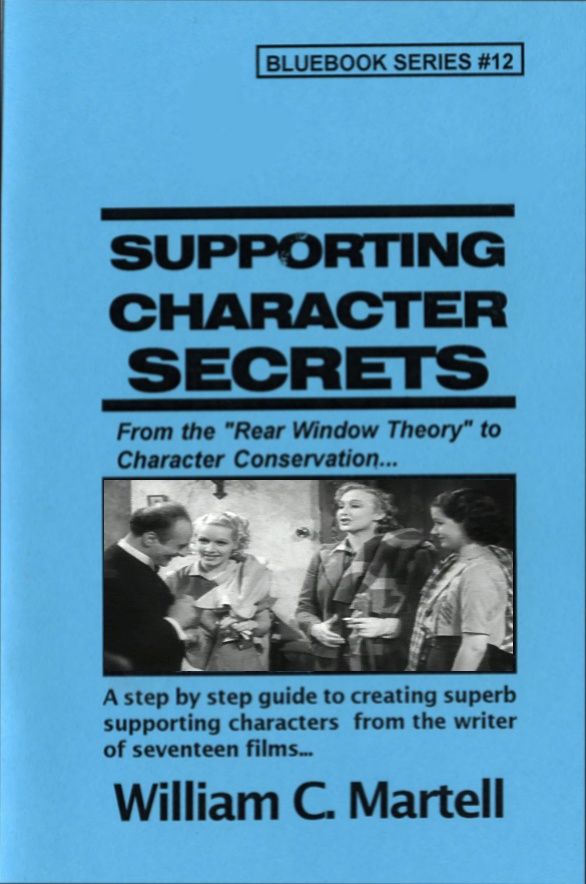
SUBPLOTS?
*** SUPPORTING CHARACTER SECRETS *** - For Kindle! (Exclusive)
Expanded version with more techniques to flesh out your Supporting Characters and make them individuals. Using the hit movie BRIDESMAIDS as well as other comedies like THE HANGOVER and TED and HIGH FIDELITY and
40 YEAR OLD VIRGIN and many other examples we look at ways to make your Supporting Characters come alive on the page.
Print version was 48 pages, Kindle version is around 170 pages!
ONLY $4.99 - and no postage!
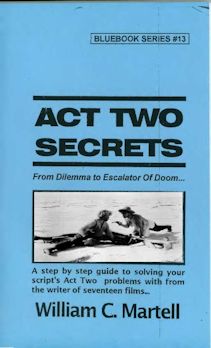
ACT TWO SOLUTIONS!
*** ACT TWO SECRETS *** - For Kindle!
Expanded version with more techniques to help you through the desert of Act Two! Subjects Include: What Is Act Two? Inside Moves, The 2 Ps: Purpose & Pacing, The 4Ds: Dilemma, Denial, Drama and Decision, Momentum, the Two Act Twos, Subplot Prisms, Deadlines, Drive, Levels Of Conflict, Escalation, When Act Two Begins and When Act Two Ends, Scene Order, Bite Sized Pieces, Common Act Two Issues, Plot Devices For Act Two, and dozens of others. Over 67,000 words (that’s well over 200 pages) of tools and techniques to get you through the desert of Act Two alive!
Print version was 48 pages, Kindle version is well over 200 pages!
ONLY $4.99 - and no postage!
BRAND NEW!!
All About Rewrites!
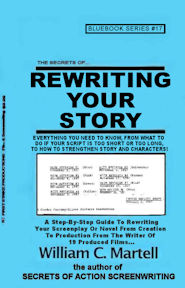
Rewriting In Waves?
*** REWRITES Blue Book! - For Kindle!
The end is just the beginning! You’ve finished your story, but now the rewriting begins! This 405 page book shows you how to rewrite your screenplay or novel to perfection. Everything from Character Consistency to Shoeboxing to How To Give And Receive Notes to 15 Solutions If Your Script’s Too Long! and 15 Solutions If Your Script’s Too Short! to Finding The Cause Of A Story Problem to Good Notes Vs. Bad Notes to Finding Beta Readers to Avoiding Predictability to Learning To Be Objective About Your Work to Script Killer Notes and Notes From Idiots to Production Rewrites and What The Page Colors Mean? and a Complete Rewrite Checklist! The complete book on Rewriting Your Story!
ONLY $4.99 - and no postage!
All About Endings!
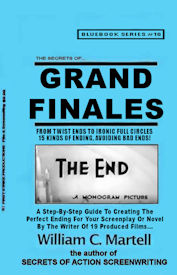
GRAND FINALES Blue Book!
The Perfect Ending For Your Story!
The First Ten Pages Of Your Screenplay Are Critical,
But What About The Last 10 Pages?
Creating the perfect ending to your story! This 100,000 word book shows you how to end your story with a bang, rather than a whimper. Everything from Resolution Order to Act Three Tools to Happy or Sad Endings? to How The Beginning Of Your Story Has Clues To The Ending (in case you were having trouble figuring out how the story should end) to Falling Action to How To Avoid Bad Endings to Writing The Perfect Twist Ending to Setting Up Sequels & Series to Emotional Resolutions to How To Write Post Credit Sequences to Avoiding Deus Ex Machinas, to 20 Different Types Of Ends (and how to write them) and much more! Everything about endings for your screenplay or novel!
Only: $4.99
NO KINDLE REQUIRED! Get the *free* app (any device, except your Mr. Coffee) on the order page on Amazon!
All About LOGLINES, TREATMENTS, and PITCHING!
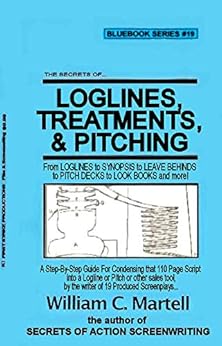
LOGLINES, TREATMENTS, and PITCHING! Blue Book!
Distilling Your Screenplay!
Loglines, Treatments, Pitching, Look Books, Pitch Decks, One Pagers, Rip-O-Matics?
You have written a brilliant 110 page screenplay, but how do you get anyone to read it? You need to distill it down into some form of verbal moonshine or story rocket fuel that will ignite that bored development executive or manager or agent and get them to request your screenplay. But how do you shrink those 110 pages into a 25 word logline or a 2 minute elevator pitch or a one page synopsis or a short paragraph? This 100,000 word book shows you how! Everything you need to know! From common logline mistakes (and how to solve them) to how your pitch can reveal story problems to the 4 types of pitches!
272 Pages - ONLY $4.99!
READY TO BREAK IN?
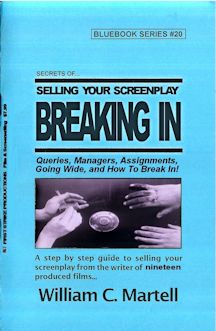
THE BUISINESS SIDE
*** BREAKING IN BLUE BOOK *** - For Kindle!
Should really be called the BUSINESS BLUE BOOK because it covers almost everything you will need to
know for your screenwriting career: from thinking like a producer and learning to speak their language,
to query letters and finding a manager or agent, to making connections (at home and in Hollywood) and
networking, to the different kinds of meetings you are will have at Studios, to the difference between
a producer and a studio, to landing an assignment at that meeting and what is required of you when you
are working under contract, to contracts and options and lawyers and... when to run from a deal!
Information you can use *now* to move your career forward! It's all here in the Biggest Blue Book yet!
Print version was 48 pages, Kindle version is over 400 pages!
$4.99 - and no postage!

Movie Magic Screenwriter is the best selling screenplay formatting software and the choice of Hollywood professionals. Screenwriter automatically formats while you write so you can focus on what you're writing, not where it goes on the page. It also formats for television, stage, novels and comic book scripts so you've got an all in one package for any story you want to write. Academy Award Tech Winner!
* * * Buy It!

|

